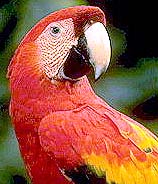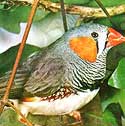Selecting and Caring for Pet Birds
Selecting a Pet Bird

Why do you want to own a bird?
There is no correct answer to this question, but it is one you should fully examine before you purchase a bird. Often a pet bird is the answer for apartment dwellers, people desiring animal companionship with minimal time or money investment, or individuals wanting an affectionate, intelligent pet. However, a bird should never be purchased on impulse. You should approach the task of purchasing a bird already aware of the characteristics of the species of bird you are interested in, the average price of that type of bird in your region and with some knowledge of how to evaluate the health and breed characteristics of the bird you are considering. This requires a bit of research and asking round before you are ready to buy, but the investment of your time saves you much grief at a later date.

Macaw
The beautiful macaws and cockatoos are not for the neophyte! Most first-time bird owners are happier with finches, canaries, budgerigars ("parakeets") or cockatiels.

Zebra Finch
Birds can be purchased from a variety of sources, such as pet shops, breeders, private dealers, or individuals. If you are buying a bird for the first time, it is almost essential that you purchase your bird from someone who is in the bird breeding and/or selling business. These individuals usually have a reputation to protect. Ask around and find out who in your area is known to deal honestly and fairly with buyers.
Many stores today, especially those specializing in birds, have been operated by bird fanciers who have turned their hobby into a business. These individuals usually know and care about their birds. They have in stock items required for basic care and maintenance of birds, such as play toys, cages, bird feed and general health supplies. Sales personnel generally offer you more information than you ever thought necessary to get you started, so leave yourself plenty of time to shop!
Health should be a primary consideration when you are choosing a bird. Pay close attention to the health of all birds you look at. A free bird, if it is sick, is not worth the long-term monetary and emotional costs. To keep it simple, a sick bird looks sick and a healthy bird looks bright, alert, active and in good feather.
The following clues are important when considering the health of a bird:
- A sick bird may sit with its feathers puffed up, its eyes may be dull or even closed.
- The nostrils of a sick bird may be clogged or somewhat occluded. An additional clue is to check the feathers above the nostrils. If they appear wet or matted, then the bird has a nasal discharge.
- A bird that appears to have breathing problems is often sick.
- If the feathers around the bird's vent or hindquarters are soiled or matted, this indicates diarrhea.
- The bird may be listless or inactive.
- The seed cup may appear not to have been touched, indicating that the bird is off-feed.
- Be on the lookout for bald spots where feathers should be.
- Pay careful attention to the following:
-swellings or sores on the feet or toes
-a protruding breastbone
-white crusts on the beak
When you are selecting your bird, you must consider its temperment. An intelligent bird with a good disposition is essential for everyone's benefit. Most birds that are for sale seem to be in a temporarily stressed condition. Do not expect too much at first, but do become aware of how different birds approach you as you make your choice. Intuition and experience are the most reliable guides someone can have in selecting a bird.
When you finally choose your bird, consider the following before money changes hands..
- If there is a problem, would you be able to locate the seller next?
- Is there a health certificate that allows for returns or exchanges within a reasonable period of time?
- Can the seller verify the bird's age and birthplace? (While this may always be possible, most reputable sellers have this information available. If not, learn how to judge the age of the bird species you want to buy.)
- Will you receive a written bill-of-sale?
- The purchase of a bird should always be contingent upon the bird being examined by a veterinarian within a few days of purchase. You should be allowed to return the animal and receive a full refund if it is not in sound health.
- The bill-of-sale should include the purchase price, the guarantee, the return policy, the bird's band number (if known) and a full description of the bird (i.e. color, sex—if known, genus and species).
[ Search Articles ] [ Article Index ]
